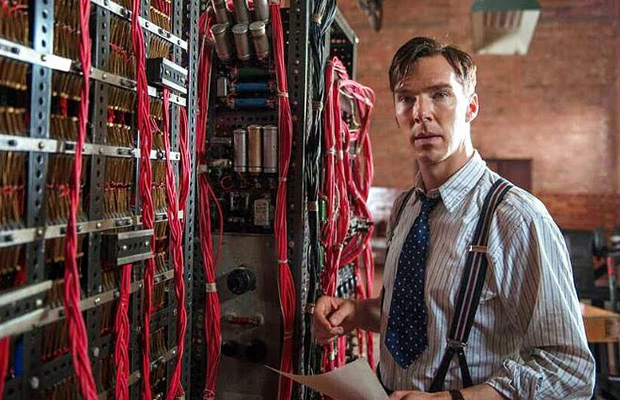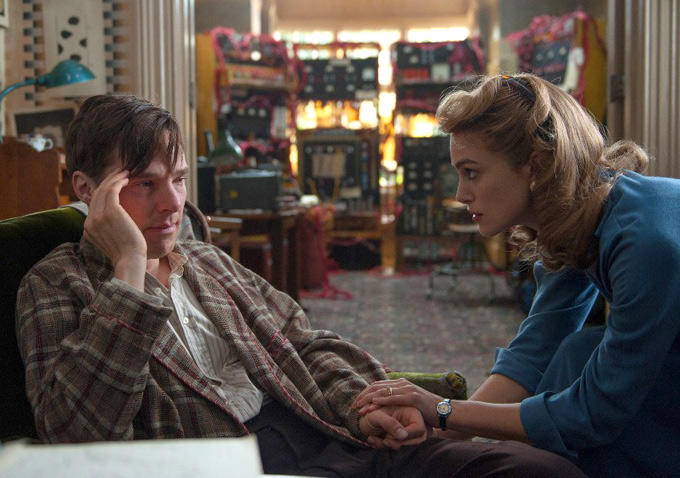The Imitation Game (2014)
DIRECTOR: Morten Tyldum
 CAST: Benedict Cumberbatch, Keira Knightley, Matthew Goode, Rory Kinnear, Mark Strong, Charles Dance
CAST: Benedict Cumberbatch, Keira Knightley, Matthew Goode, Rory Kinnear, Mark Strong, Charles Dance
REVIEW:
Does the name Alan Turing mean anything to you? Chances are it doesn’t, despite him being credited with shortening WWII by as much as two years, saving an estimated 14 million lives, as well as giving birth to the prototype of the computer. Director Morten Tyldum and screenwriter Graham Moore’s biopic/docudrama, working off Andrew Hodges’ Turing biography, is a belated attempt to bring some deserved recognition both to Alan Turing’s accomplishments and the disgrace of what eventually happened to one of the most unsung heroes of WWII.
The Imitation Game cuts back-and-forth between three different time periods. The bulk of the film takes place during WWII, when British mathematical genius Alan Turing (Benedict Cumberbatch) is recruited by military intelligence for a top-secret program, joining a small team of cryptographers led by Hugh Alexander (Matthew Goode) assigned to crack the Enigma Machine which the Germans use to encrypt all important communications. The aptly-named Enigma is said to be unbreakable, and for a while, it seems it might live up to its reputation. But with the help of his colleagues, in particular Joan Clarke (Keira Knightley), Turing constructs a machine of his own which he nicknames “Christopher”, under the belief that it takes a machine to defeat another machine…a theory that is eventually validated. Periodically, we flashback in time to Turing’s private school boyhood (where he is played by Alex Lawther), where the nerdy and socially awkward Turing’s only friend is a schoolmate named Christopher with whom he exchanges encrypted notes for fun. Finally, we jump ahead in time to the post-war early 1950s, where a nosy detective (Rory Kinnear) thinks Turing is hiding something. He’s right about that much, but wrong about his suspicions that Turing is a Soviet spy. What he actually stumbles across is Turing’s homosexuality, which in the climate of 1950s Britain, where homosexuality is illegal, leads to Turing’s arrest for “indecency”, forcible hormone injections aimed at “curing” his homosexuality, and his eventual suicide.
It’s to the script and direction’s credit that despite cross-cutting between segments set in the 1920s, 1940s, and 1950s, The Imitation Game for the most part flows smoothly and coherently and works on multiple levels as an engrossing international espionage drama that at times feels like something written by John Le Carre, a biopic of an underappreciated and mistreated genius, and a condemnation of a particularly shameful case of social injustice. To its credit, The Imitation Game avoids laying the latter on so thick that it ever feels preachy, simply laying out the facts and letting them speak for themselves (in this regard, it is more subdued than fellow critical darling Selma, which seems at times to be blatantly clutching for laurels). The movie wisely avoids getting so technical about Turing’s machine that average viewers will get lost. We’re given enough basic detail to understand, more or less, the basic concept of how it works, without going so in-depth that one has to be a mathematical genius to understand the film. The emphasis is more on the interpersonal relationships among the team than technical jargon, making the movie more relatable. The movie also includes some fascinating tidbits that drive home how difficult the task facing Turing and his colleagues is, such as the fact that the Germans change their codes at the stroke of midnight every day, giving the codebreakers only one day to try to decipher Enigma’s estimated 150 million possible combinations before everything is changed and they must start all over again from scratch, all their frantic exhausting work from the day before instantly rendered useless. And even when Turing cracks Enigma, the plot only thickens. The team quickly realizes that possibly even more difficult than obtaining information is deciding how to use it. An agonizingly hard decision is faced when the team learns of an imminent U-Boat ambush on a British convoy: they could warn the convoy and prevent one attack, but at the possible cost of tipping off the Germans that Enigma has been compromised and leading them to devise a new machine, again shutting them out in the dark. The others reluctantly see the wisdom in Turing’s seemingly cold argument that it’s not about winning one battle, but about winning the war. Another plot complication comes when Turing realizes one of his colleagues (Allen Leech) is a Soviet spy…who has in turn deduced Turing’s homosexuality. “You tell them my secret, and I’ll tell them yours”, he is warned.
When it comes to its portrayal of the central character, this is very much a warts-and-all portrait. The movie and Cumberbatch’s performance do not try to make Turing more likable or more sympathetic than he was. He is outwardly cold, abrasively arrogant about his superior intellect, and undiplomatic about expressing his belief that he is the smartest man in the room. It takes Joan to point out that “they’re not going to help you if they don’t like you” (this leads to an amusing scene in which the haplessly socially awkward Turing tries to make friends with his colleagues). Much is made of the relationship between Turing and Joan, which becomes a close working partnership with pseudo-romantic overtones. Joan faces some social prejudice of her own; when she shows up to join Turing’s staff, the welcoming officer assumes she’s an applicant for a secretary position, and it’s only Turing’s help that gets her past the door. Turing and Joan undoubtedly “click” on some level, even if he’s not able to love her the way she might want him to. Turing’s homosexuality is not explicitly revealed until around the halfway mark, where it becomes the final puzzle piece lending context to various other bits (including the poignant full reason why he calls his beloved machine “Christopher”).
 As fans of his lead role as Sherlock Holmes on the BBC series Sherlock will know, there’s a reason Benedict Cumberbatch has become slightly typecast as a neurotic, anti-social genius: because he’s so good at it. Cumberbatch’s performance as the irascible-but-brilliant Turing (which was nominated for a Golden Globe and an Oscar) is spot-on. He’s believable as an intellectual—a quality some actors cannot project convincingly—and captures Turing’s obsessive drive, his neuroses, his arrogance, and his tightly-guarded vulnerability. It’s easy to understand why his colleagues initially find him insufferable, but as the movie goes on, Cumberbatch brings out more of Turing’s humanity. In the supporting cast, Keira Knightley is also solid as Turing’s pseudo love interest, as is Matthew Goode as his rival-turned-comrade. Mark Strong, who’s no stranger to this sort of mysterious international espionage (both he and Cumberbatch were in Tinker, Tailor, Soldier Spy) is perfect as the MI6 agent keeping an eye on the project and the people in it, and Charles Dance, who has used his stern demeanor to great effect on the HBO series Game of Thrones, gets to use it again here as the crusty Admiral overseeing the operation.
As fans of his lead role as Sherlock Holmes on the BBC series Sherlock will know, there’s a reason Benedict Cumberbatch has become slightly typecast as a neurotic, anti-social genius: because he’s so good at it. Cumberbatch’s performance as the irascible-but-brilliant Turing (which was nominated for a Golden Globe and an Oscar) is spot-on. He’s believable as an intellectual—a quality some actors cannot project convincingly—and captures Turing’s obsessive drive, his neuroses, his arrogance, and his tightly-guarded vulnerability. It’s easy to understand why his colleagues initially find him insufferable, but as the movie goes on, Cumberbatch brings out more of Turing’s humanity. In the supporting cast, Keira Knightley is also solid as Turing’s pseudo love interest, as is Matthew Goode as his rival-turned-comrade. Mark Strong, who’s no stranger to this sort of mysterious international espionage (both he and Cumberbatch were in Tinker, Tailor, Soldier Spy) is perfect as the MI6 agent keeping an eye on the project and the people in it, and Charles Dance, who has used his stern demeanor to great effect on the HBO series Game of Thrones, gets to use it again here as the crusty Admiral overseeing the operation.
“Bittersweet” is a good descriptor for The Imitation Game. There are times when we have a triumphant moment, where this flirts with feeling like a “feel good” true story about an underdog achieving something impossible, but the inevitability of what ends up happening to Turing taints everything. The movie’s real heart and soul is the exposure and condemnation of the way a brilliant mind and an invaluable resource to the war effort was destroyed by petty ignorance and prejudice. That it achieves this without preaching, and that its social commentary co-exists with an engrossing WWII espionage drama, makes The Imitation Game a solid and engaging film that’s worth viewing for more than one reason. Perhaps nothing so long after the fact can make up for the injustice of what was done to Alan Turing (and many others like him, before, during, and after the same time period), but at least maybe a few more people might know his name and recognize his achievements.
* * *